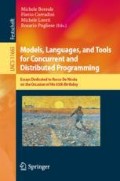Abstract
Provenance properties help asses the level of trust on the integrity of resources and events. One of the problems of interest is to find the right balance between the expressive power of the provenance specification language and the amount of historical information that needs to be remembered for each resource or event. This gives rise to possibly conflicting objectives relevant to integrity, privacy, and performance. Related problems are how to reduce historical information in a way that the provenance properties of interest are preserved, that is suitable for a distributed setting, and that relies on an incremental construction. We investigate these problems in a simple model of computation where resources/events and their dependencies form an acyclic directed graph, and computation steps consist of addition of new resources and of provenance-based queries. The model is agnostic with respect to the actual provenance specification language. We present then a framework, parametric on such language, for distributing, and incrementally constructing reduced histories in a sound and complete way. In the resulting model of computation, reduced histories are computed incrementally and queries are tested locally on reduced histories. We study different choices for instantiating the framework with concrete provenance specification languages, and their corresponding provenance-preserving history reduction techniques.
This work has been supported by the EU H2020-SU-ICT-03-2018 Project No. 830929 CyberSec4Europe (cybersec4europe.eu).
Access this chapter
Tax calculation will be finalised at checkout
Purchases are for personal use only
Notes
- 1.
Note that we do not introduce self-loop transitions in leaf states/resources. This allows formulae to observe whether a resource has dependencies. Alternatively, loops could have been introduced as usual in CTL semantics. In that case, the ability to observe absence of dependencies can be obtained with a dedicated predicate.
References
Aceto, L., De Nicola, R., Fantechi, A.: Testing equivalences for event structures. In: Zilli, M.V. (ed.) Mathematical Models for the Semantics of Parallelism. LNCS, vol. 280, pp. 1–20. Springer, Heidelberg (1987). https://doi.org/10.1007/3-540-18419-8_9
Abd Alrahman, Y., De Nicola, R., Loreti, M.: On the power of attribute-based communication. In: Albert, E., Lanese, I. (eds.) FORTE 2016. LNCS, vol. 9688, pp. 1–18. Springer, Cham (2016). https://doi.org/10.1007/978-3-319-39570-8_1
Altintas, I., Wang, J., Crawl, D., Li, W.: Challenges and approaches for distributed workflow-driven analysis of large-scale biological data: vision paper. In: Srivastava, D., Ari, I. (eds.) Proceedings of the 2012 Joint EDBT/ICDT Workshops, Berlin, Germany, 30 March 2012, pp. 73–78. ACM (2012). https://doi.org/10.1145/2320765.2320791
Bodei, C., Degano, P., Ferrari, G.L., Galletta, L.: Tracing where IoT data are collected and aggregated. Log. Methods Comput. Sci. 13(3) (2017). https://doi.org/10.23638/LMCS-13(3:5)2017
Chavan, A., Huang, S., Deshpande, A., Elmore, A.J., Madden, S., Parameswaran, A.G.: Towards a unified query language for provenance and versioning. In: Missier, P., Zhao, J. (eds.) 7th USENIX Workshop on the Theory and Practice of Provenance, TaPP 2015, Edinburgh, Scotland, UK, 8–9 July 2015. USENIX Association (2015). https://www.usenix.org/conference/tapp15/workshop-program/presentation/chavan
Davidson, S.B., Freire, J.: Provenance and scientific workflows: challenges and opportunities. In: Wang, J.T. (ed.) Proceedings of the ACM SIGMOD International Conference on Management of Data, SIGMOD 2008, Vancouver, BC, Canada, 10–12 June 2008, pp. 1345–1350. ACM (2008). https://doi.org/10.1145/1376616.1376772
De Nicola, R.: Extensional equivalences for transition systems. Acta Inf. 24(2), 211–237 (1987). https://doi.org/10.1007/BF00264365
De Nicola, R., Ferrari, G.L., Pugliese, R.: KLAIM: a kernel language for agents interaction and mobility. IEEE Trans. Softw. Eng. 24(5), 315–330 (1998). https://doi.org/10.1109/32.685256
De Nicola, R., Ferrari, G.L., Pugliese, R., Tiezzi, F.: A formal approach to the engineering of domain-specific distributed systems. In: Serugendo, G.D.M., Loreti, M. (eds.) COORDINATION 2018. LNCS, vol. 10852, pp. 110–141. Springer, Cham (2018). https://doi.org/10.1007/978-3-319-92408-3_5
De Nicola, R., Hennessy, M.: Testing equivalences for processes. Theor. Comput. Sci. 34, 83–133 (1984). https://doi.org/10.1016/0304-3975(84)90113-0
De Nicola, R., Loreti, M., Pugliese, R., Tiezzi, F.: A formal approach to autonomic systems programming: the SCEL language. TAAS 9(2), 7:1–7:29 (2014). https://doi.org/10.1145/2619998
De Nicola, R., Montanari, U., Vaandrager, F.: Back and forth bisimulations. In: Baeten, J.C.M., Klop, J.W. (eds.) CONCUR 1990. LNCS, vol. 458, pp. 152–165. Springer, Heidelberg (1990). https://doi.org/10.1007/BFb0039058
De Nicola, R., Vaandrager, F.: Action versus state based logics for transition systems. In: Guessarian, I. (ed.) LITP 1990. LNCS, vol. 469, pp. 407–419. Springer, Heidelberg (1990). https://doi.org/10.1007/3-540-53479-2_17
De Nicola, R., Vaandrager, F.W.: Three logics for branching bisimulation. J. ACM 42(2), 458–487 (1995). https://doi.org/10.1145/201019.201032
Groote, J.F., Vaandrager, F.: An efficient algorithm for branching bisimulation and stuttering equivalence. In: Paterson, M.S. (ed.) ICALP 1990. LNCS, vol. 443, pp. 626–638. Springer, Heidelberg (1990). https://doi.org/10.1007/BFb0032063
Holland, D.A., Braun, U.J., Maclean, D., Muniswamy-Reddy, K.K., Seltzer, M.I.: Choosing a data model and query language for provenance. In: Freire, J., Koop, D. (eds.) IPAW 2008. LNCS, vol. 5272. Springer, Heidelberg (2008)
Paige, R., Tarjan, R.E.: Three partition refinement algorithms. SIAM J. Comput. 16(6), 973–989 (1987). https://doi.org/10.1137/0216062
Baldoni, R., De Nicola, R., Prinetto, P.: The future of cybersecurity in Italy: strategic focus areas. Laboratorio Nazionale di Cybersecurity, CINI - Consorzio Interuniversitario Nazionale per l’Informatica (2018). https://www.consorzio-cini.it/index.php/it/labcs-home/libro-bianco
Author information
Authors and Affiliations
Corresponding author
Editor information
Editors and Affiliations
Rights and permissions
Copyright information
© 2019 Springer Nature Switzerland AG
About this chapter
Cite this chapter
Lluch Lafuente, A. (2019). A Framework for Provenance-Preserving History Distribution and Incremental Reduction. In: Boreale, M., Corradini, F., Loreti, M., Pugliese, R. (eds) Models, Languages, and Tools for Concurrent and Distributed Programming. Lecture Notes in Computer Science(), vol 11665. Springer, Cham. https://doi.org/10.1007/978-3-030-21485-2_26
Download citation
DOI: https://doi.org/10.1007/978-3-030-21485-2_26
Published:
Publisher Name: Springer, Cham
Print ISBN: 978-3-030-21484-5
Online ISBN: 978-3-030-21485-2
eBook Packages: Computer ScienceComputer Science (R0)

